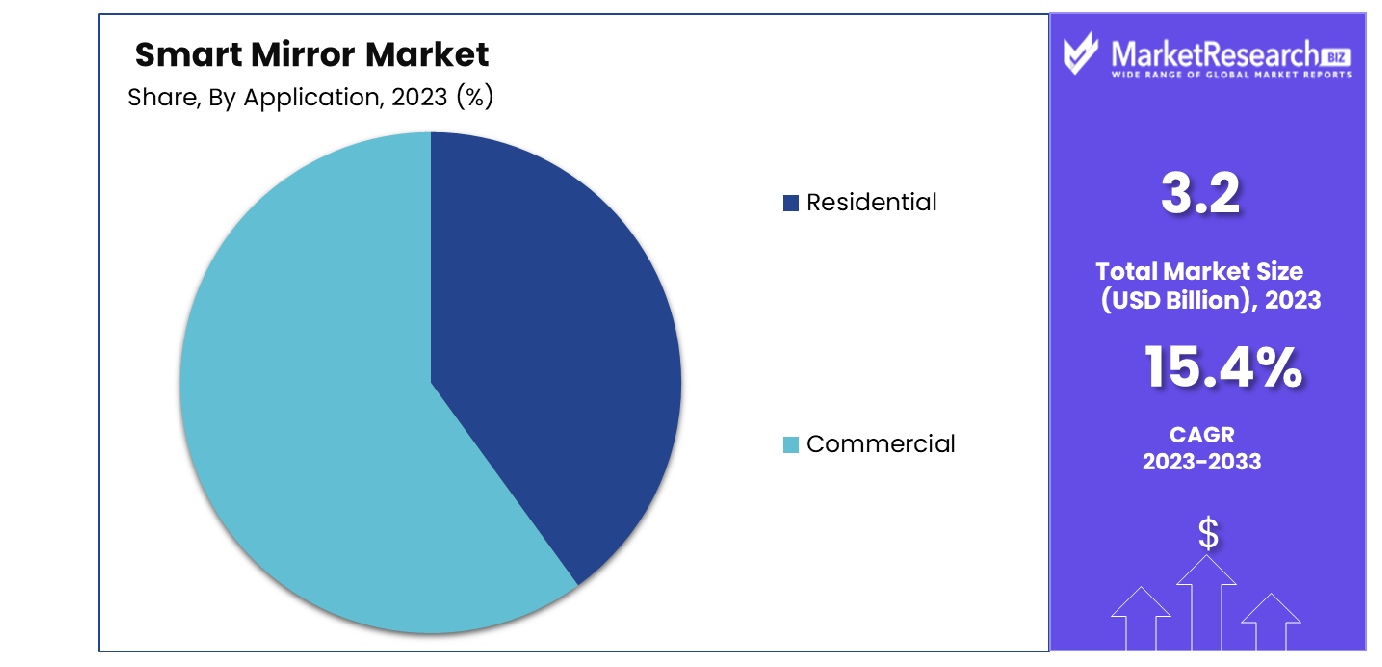
Smart Mirror Market By Installation Type(Wall Mounted, Free-Standing), By Application(Residential, Commercial), By Distribution Channel(Online, Offline), By Region And Companies - Industry Segment Outlook, Market Assessment, Competition Scenario, Trends, And Forecast 2024-2033
-
44077
-
March 2024
-
179
-
-
This report was compiled by Research Team Research team of over 50 passionate professionals leverages advanced research methodologies and analytical expertise to deliver insightful, data-driven market intelligence that empowers businesses across diverse industries to make strategic, well-informed Correspondence Research Team Linkedin | Detailed Market research Methodology Our methodology involves a mix of primary research, including interviews with leading mental health experts, and secondary research from reputable medical journals and databases. View Detailed Methodology Page
-
Quick Navigation
Report Overview
The smart mirror market was valued at USD 3.2 billion in 2023. It is expected to reach USD 12.9 billion by 2033, with a CAGR of 15.4% during the forecast period from 2024 to 2033. The surge in demand in various industries and new advanced technologies are some of the main key driving factors for the smart mirror market.
Smart mirrors are defined as technologically advanced reflective surfaces that combine digital features and information displays into an old mirror. These are typically designed with a two-way mirror, which covers all the electronic elements like display, cameras, and sensors behind the reflective surface. Such mirrors can function as an interactive interface by offering real-time information like time, calendars, weather updates, and fitness metrics.

Individuals can personalize the displayed content based on personal choices. Some of the smart mirrors have voice recognition and touch screen potentialities for intuitive touch. Moreover, smart mirrors work as smart home centers that connect with other devices like thermostats, security digital cameras, and lighting systems. The integration of the reflection and digital display in the smart mirrors provides a seamless and futuristic user experience, finding applications in homes, retail surroundings, and fitness centers.
Digital health news in January 2024, Barcoda, a France-based firm, connected health service providers has launched Bmind, the world’s first AI-powered smart mirror for mental wellness. It has the potential to know about mental well-being and manage stress accordingly. Moreover, News18 in January 2022, highlights that Wellnesys, an Indian startup firm has launched “Aria”, a smart mirror that gathers together the fusion of AR/VR, smart sensing, and computer sensing solutions to offer interactive and immersive digital experience through smart TVs and smart mirrors. This smart mirror is a 32 to 43-inch touch-sensitive LED display inserted with computer vision technologies for face and gesture recognition.
Smart mirrors have several advantages such as it boosts reality features for virtual try-ons in clothing stores and makeup applications. They also have health monitoring facilities, tracking vital signs and offering fitness feedback. These advanced technological smart mirrors serve as interactive educational equipment by showcasing the information in actual time for learning purposes.
These innovations have made smart mirrors a much more versatile addition to healthcare, and educational settings, and healthcare that display a widening role in enhancing user experience and identifying multiple industrial requirements. The surge in demand for smart mirrors will be increased due to its requirement in various industrial sectors which will help in market expansion in the coming years.
Key Takeaways
- Market Growth: The smart mirror market was valued at USD 3.2 billion in 2023. It is expected to reach USD 12.9 billion by 2033, with a CAGR of 15.4% during the forecast period from 2024 to 2033.
- By Installation Type: Wall-mounted smart mirrors dominate installation preferences, comprising 80.5% of the market share.
- By Application: Commercial applications drive the majority of smart mirror usage, accounting for 55.8% of deployments.
- By Distribution Channel: Offline distribution channels remain prevalent, capturing 70.3% of smart mirror sales.
- Regional Dominance: In North America, the Smart Mirror Market commands a substantial share of 45.5%.
- Growth Opportunity: In 2023, the global smart mirror market thrived due to advancements in IoT and AI technologies, offering personalized user experiences through features like virtual try-ons and customized content displays.
Driving factors
Demand for Innovative and Connected Devices Driving Smart Mirror Market Growth
The growth of the Smart Mirror Market can be attributed to the increasing demand for innovative and connected devices. Consumers are increasingly seeking products that offer not just functionality but also connectivity and convenience. Smart mirrors, equipped with features such as integrated displays, touch controls, and connectivity with other smart devices, fulfill these evolving consumer needs.
Transition from Traditional to Digital Stores Boosting Smart Mirror Adoption
The transition from traditional brick-and-mortar stores to digital stores in the retail industry is significantly contributing to the growth of the Smart Mirror Market. Retailers are embracing digital technologies to enhance customer experiences and streamline operations. Smart mirrors find extensive applications in retail settings, offering virtual try-on solutions, personalized recommendations, and interactive shopping experiences. This adoption market trend is fueling market growth, with reports indicating a substantial increase in the deployment of smart mirrors across retail outlets worldwide.
Proliferation of Start-ups and New Companies Propelling Market Expansion
The Smart Mirror Market is experiencing rapid expansion due to the rising number of start-ups and new companies entering the industry. These emerging major players are introducing innovative technologies and disrupting traditional market dynamics. Their focus on research and development, coupled with agile business models, is driving innovation and pushing the boundaries of smart mirror capabilities. As a result, the market is witnessing a surge in product offerings, contributing to increased market penetration and revenue growth. Analysis suggests that the influx of start-ups and new entrants is expected to fuel further market expansion in the coming years.
Restraining Factors
Complex Installation and Maintenance Impeding Smart Mirror Market Growth
The complexity associated with the installation and maintenance of smart mirrors presents a significant restraint on market growth. Installation often necessitates specialized expertise, which can be a deterrent for consumers seeking convenient solutions. Moreover, ongoing maintenance requirements, including software updates and troubleshooting, pose additional challenges and may deter potential buyers.
These complexities contribute to a slower adoption rate, hindering the market's expansion. Recent statistics indicate that concerns regarding installation and maintenance have led to a slight dip in consumer confidence, impacting market growth projections.
Reliability and Performance Concerns Hampering Market Expansion
Reliability and performance issues pose a notable barrier to the growth of the Smart Mirror Market. Consumer confidence in smart mirror technology is undermined by concerns about its reliability, durability, and performance. Issues such as lag, glitches, or system failures can significantly impact user experience and erode trust in the product.
Despite advancements in technology, reports suggest that lingering concerns regarding reliability persist, influencing purchasing decisions and impeding market expansion. As a result, the market is experiencing a slight deceleration in growth, with projections adjusted to account for consumer apprehensions related to reliability and performance.
By Installation Type Analysis
Wall-mounted smart mirrors dominate installations, comprising 80.5% of the market share.
In 2023, Wall Mounted held a dominant market position in the Installation Type segment of the Smart Mirror Market, capturing more than an 80.5% share. This significant market share underscores the preference for wall-mounted installations among consumers and businesses alike. The appeal of wall-mounted smart mirrors lies in their space-saving design, seamless integration into existing interiors, and versatile applications across various settings such as residential, commercial, and hospitality sectors.
Wall-mounted smart mirrors are favored for their sleek aesthetics and functionality, offering a modern solution for enhancing both convenience and style in diverse environments. As technological advancements continue to drive innovation in the smart mirror industry, wall-mounted installations remain at the forefront, leveraging features such as touch-screen interfaces, voice-activated controls, and IoT connectivity to meet the evolving needs of users.
Moreover, the proliferation of smart home technologies and the growing emphasis on personalized experiences contribute to the sustained demand for wall-mounted smart mirrors. With consumers increasingly seeking solutions that blend technology seamlessly into their daily routines, wall-mounted installations present an attractive option for transforming traditional mirrors into interactive hubs for information, entertainment, and productivity.
By Application Analysis
Commercial applications account for the majority, with 55.8% market penetration.
In 2023, Commercial held a dominant market position in the By Application segment of the Smart Mirror Market, capturing more than a 55.8% share. The market witnessed robust growth driven primarily by the escalating demand for smart mirrors in commercial spaces such as hotels, restaurants, retail outlets, and corporate offices. Commercial establishments increasingly adopted smart mirrors to enhance customer experience, offering interactive features like virtual try-ons, personalized advertisements, and real-time data display.
Moreover, the integration of advanced technologies including augmented reality (AR) and artificial intelligence (AI) into smart mirrors further propelled their adoption in commercial settings. These technological advancements enabled smart mirrors to provide customized recommendations, interactive shopping experiences, and personalized content delivery, thereby amplifying their utility across various sectors.
Additionally, the growing emphasis on enhancing aesthetics and functionality in commercial spaces fueled the deployment of smart mirrors as they offer a blend of utility and sophistication. The ability of smart mirrors to serve as multifunctional devices, combining reflective surfaces with digital displays and interactive capabilities, contributed significantly to their popularity among commercial end-users.
Looking ahead, the commercial segment is poised for sustained growth supported by ongoing innovations in smart mirror technology, expanding applications in sectors such as hospitality, retail, and healthcare, and the rising trend of digital transformation in commercial environments. As businesses continue to prioritize enhancing customer engagement and operational efficiency, the demand for smart mirrors in commercial settings is anticipated to witness steady growth, further consolidating the segment's dominant market position.

By Distribution Channel Analysis
Offline channels lead distribution, capturing 70.3% of smart mirror sales.
In 2023, Offline held a dominant market position in the By Distribution Channel segment of the Smart Mirror Market, capturing more than a 70.3% share. Offline distribution channels encompass brick-and-mortar retail outlets, specialty stores, and department stores, providing customers with tangible experiences and immediate product availability. This substantial market share underscores the enduring preference for traditional shopping experiences despite the increasing digitization of retail.
Online distribution channels, on the other hand, accounted for the remaining 29.7% share. The online segment includes e-commerce platforms, direct-to-consumer websites, and third-party online retailers. While online channels offer convenience and accessibility, they face challenges such as shipping delays, product authenticity concerns, and the inability of customers to physically interact with the product before purchase.
Offline dominance can be attributed to several factors. Firstly, consumers often value the in-person shopping experience, particularly for products like smart mirrors, where physical demonstration and consultation can be beneficial. Additionally, brick-and-mortar retailers leverage strategic location placement and engaging store layouts to attract customers and drive sales. Moreover, offline channels facilitate immediate product gratification, as customers can purchase and take home the product instantly.
Key Market Segments
By Installation Type
- Wall Mounted
- Free-Standing
By Application
- Residential
- Commercial
By Distribution Channel
- Online
- Offline
Growth Opportunity
Advancements in IoT and AI Technologies
The global smart mirror market witnessed significant growth in 2023, largely fueled by continuous advancements in the Internet of Things (IoT) and artificial intelligence (AI) technologies. These technological advancements have paved the way for the development of more sophisticated and feature-rich smart mirrors.
By leveraging IoT capabilities, smart mirrors can seamlessly connect with other smart devices in the home, enabling enhanced functionality and integration within smart home ecosystems. AI-powered features such as facial recognition, voice control, and predictive analytics further enhance the user experience, making smart mirrors more intuitive and responsive to individual needs.
Growing Emphasis on Personalized User Experience
In 2023, the global smart mirror market experienced robust growth driven by a growing emphasis on personalized user experiences. Smart mirrors are increasingly being adopted for their ability to offer tailored experiences to users. Features such as virtual try-ons for cosmetics and apparel, personalized health and fitness tracking, and customized content display based on user preferences are resonating well with consumers.
This trend reflects a shift towards more personalized and interactive solutions in the retail, healthcare, and hospitality sectors. As consumers seek products and services that cater to their individual needs and preferences, smart mirrors are positioned as a key enabler of personalized experiences, driving further market expansion.
Latest Trends
Incorporation of Health and Wellness Tracking Features
In the dynamic landscape of the global Smart Mirror Market demand, 2023 witnessed a significant surge in the integration of health and wellness tracking features. As consumers increasingly prioritize health consciousness, manufacturers responded by embedding innovative functionalities into smart mirrors. These mirrors now serve as holistic wellness companions, offering real-time monitoring of vital health metrics such as heart rate, body temperature, and even skin condition analysis.
The growth of this trend can be attributed to the escalating demand for convenient yet comprehensive health management solutions, aligning with the prevailing societal emphasis on well-being. Consequently, market major players are compelled to collaborate with healthcare experts and technology partners to ensure the accuracy and reliability of these embedded tracking systems. The advent of such multifaceted smart mirrors not only augments user experience but also reflects the industry's commitment to catering to evolving consumer needs.
Enhanced Customization Options and Personalization Capabilities
In tandem with the evolution of consumer preferences, the Smart Mirror Market in 2023 witnessed a notable emphasis on enhanced customization options and personalization capabilities. Recognizing the diverse requirements of end-users across different demographics and lifestyle segments, manufacturers have embraced advanced technologies to offer tailored experiences. These next-generation smart mirrors boast intuitive interfaces, allowing users to customize settings, layouts, and content according to their preferences.
From adjustable lighting modes to personalized skincare recommendations, the level of customization extends to various aspects, enhancing user engagement and satisfaction. This trend underscores the industry's commitment to delivering seamless and immersive interactions, thereby solidifying the position of smart mirrors as indispensable lifestyle companions in modern households.
Regional Analysis
In North America, the Smart Mirror Market accounts for a dominant 45.5% share, reflecting substantial regional growth.
In the burgeoning Smart Mirror market, North America emerges as the dominant region, accounting for a substantial 45.5% share. The region's dominance can be attributed to its robust technological infrastructure, high adoption rate of smart home devices, and significant investments in research and development initiatives. Furthermore, the presence of key market players and a tech-savvy consumer base propel the market's growth trajectory in North America.
Europe follows closely behind, exhibiting notable growth in the Smart Mirror market. With increasing consumer awareness regarding smart technologies, coupled with favorable government regulations promoting energy efficiency and sustainability, Europe showcases a promising landscape for market expansion. The region benefits from a mature economy, facilitating the widespread adoption of innovative smart mirror solutions across residential and commercial sectors.
Asia Pacific emerges as a rapidly growing market for Smart Mirrors, driven by factors such as urbanization, rising disposable income levels, and a growing preference for connected devices. Countries like China, Japan, and South Korea are at the forefront of technological advancements, fostering a conducive environment for market proliferation. Additionally, initiatives promoting smart city development and digital transformation initiatives further augment market growth in the region.
In the Middle East & Africa and Latin America regions, the Smart Mirror market is also witnessing gradual traction, albeit at a slower pace compared to other regions. Factors such as improving economic conditions, increasing urbanization, and a burgeoning hospitality sector contribute to market growth in these regions. However, challenges related to infrastructure limitations and affordability constraints hinder the market's full potential.

Key Regions and Countries
North America
- The US
- Canada
- Rest of North America
Europe
- Germany
- France
- The UK
- Spain
- Netherlands
- Russia
- Italy
- Rest of Europe
Asia-Pacific
- China
- Japan
- Singapore
- Thailand
- South Korea
- Vietnam
- India
- New Zealand
- Rest of Asia Pacific
Latin America
- Mexico
- Brazil
- Rest of Latin America
Middle East & Africa
- Saudi Arabia
- South Africa
- UAE
- Rest of Middle East & Africa
Key Players Analysis
In 2023, the global Smart Mirror Market witnessed significant strides with key players like ELECTRIC MIRROR, INC., Séura, Hidden Television, Majestic Mirror & Frame, AVIS Electronics Company, FOSHAN ETERNA INTELLIGENT BATHROOM CO., LTD., Reflectel, LumiDesign, Evervue USA Inc., and Videotree shaping its landscape. These key companies, each contributing unique innovations and solutions, played pivotal roles in driving market growth and innovation.
ELECTRIC MIRROR, INC., a frontrunner in the sector, continued to lead with its cutting-edge technology and sleek designs, setting industry benchmarks. Séura's commitment to blending technology seamlessly with aesthetics earned it a notable position, appealing to discerning consumers seeking sophistication and functionality in smart mirror solutions. Hidden Television stood out with its focus on multifunctionality, catering to the evolving needs of consumers who demand versatile home electronics.
Majestic Mirror & Frame's expertise in crafting customizable solutions ensured it remained a preferred choice among commercial and residential clients alike. AVIS Electronics company's emphasis on user experience and affordability widened its consumer base, fostering accessibility to smart mirror technology. FOSHAN ETERNA INTELLIGENT BATHROOM CO., LTD. made significant strides in integrating smart mirrors into bathroom environments, enhancing convenience and luxury.
Reflectel, LumiDesign, Evervue USA Inc., and Videotree continued to diversify the market with their innovative features, catering to niche segments and expanding the scope of smart mirror applications. As these key players continue to innovate and collaborate, the global Smart Mirror Market is poised for sustained growth, driven by advancements in technology, increasing consumer adoption, and a growing awareness of the benefits offered by smart mirror solutions.
Market Key Players
- ELECTRIC MIRROR, INC.
- Séura
- Hidden Television
- Majestic Mirror & Frame
- AVIS Electronics company
- FOSHAN ETERNA INTELLIGENT BATHROOM CO., LTD.
- Reflectel
- LumiDesign
- Evervue USA Inc.
- Videotree
Recent Development
- In February 2024, H&M launched its first North American resale shop-in-shop in SoHo, NYC, curated by James Veloria. The 10,000 sq ft store features trendy womenswear, mobile checkout, smart mirrors, and online order pick-up lockers.
- In January 2024, PYMNTS Intelligence highlights consumer interest in smart mirrors for in-store shopping. Retailers like Amazon, Macy’s, and Timberland have explored smart mirror technology. Concerns about AI's impact persist among consumers.
- In January 2024, Generative AI integrated into smart mirrors poses ethical concerns about privacy and self-image. Dr. Lance B. Eliot explores the implications of AI in everyday mirrors.
Report Scope
Report Features Description Market Value (2023) USD 3.2 Billion Forecast Revenue (2033) USD 12.9 Billion CAGR (2024-2032) 15.4% Base Year for Estimation 2023 Historic Period 2016-2023 Forecast Period 2024-2033 Report Coverage Revenue Forecast, Market Dynamics, COVID-19 Impact, Competitive Landscape, Recent Developments Segments Covered By Installation Type(Wall Mounted, Free-Standing), By Application(Residential, Commercial), By Distribution Channel(Online, Offline) Regional Analysis North America - The US, Canada, Rest of North America, Europe - Germany, France, The UK, Spain, Italy, Russia, Netherlands, Rest of Europe, Asia-Pacific - China, Japan, South Korea, India, New Zealand, Singapore, Thailand, Vietnam, Rest of Asia Pacific, Latin America - Brazil, Mexico, Rest of Latin America, Middle East & Africa - South Africa, Saudi Arabia, UAE, Rest of Middle East & Africa Competitive Landscape ELECTRIC MIRROR, INC., Séura, Hidden Television, Majestic Mirror & Frame, AVIS Electronics company, FOSHAN ETERNA INTELLIGENT BATHROOM CO., LTD., Reflectel, LumiDesign, Evervue USA Inc., Videotree Customization Scope Customization for segments, region/country-level will be provided. Moreover, additional customization can be done based on the requirements. Purchase Options We have three licenses to opt for Single User License, Multi-User License (Up to 5 Users), Corporate Use License (Unlimited User and Printable PDF) -
-
- ELECTRIC MIRROR, INC.
- Séura
- Hidden Television
- Majestic Mirror & Frame
- AVIS Electronics company
- FOSHAN ETERNA INTELLIGENT BATHROOM CO., LTD.
- Reflectel
- LumiDesign
- Evervue USA Inc.
- Videotree




